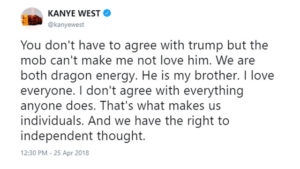Growing up, I had to deal with many instances of embarrassment. Not only was I a normal awkward pre-teen that had braces and didn’t know how to talk to people, I also had Tim Sackett as my father. As many of you know, my Dad has a very interesting sense of humor. My Mom likes to explain it like this: when you’re making a joke, there’s a line and if you cross that line, you enter a place where you can offend someone. My Father has no regard for this line whatsoever and is constantly crossing it. Many people (me included) think my Dad is hilarious, but I always was constantly worried that my Dad was going to embarrass me in some way or offend someone.
Recently, there seems to be a gap between certain generations and what they find funny. We are seeing more and more instances of people getting offended or feeling uncomfortable from a joke made by someone from a different generation. While this type of thing isn’t uncommon, it can be particularly tricky in an era where being more culturally aware or politically correct is more of a concern. There are two types of situations to watch out for when thinking about humor in a workplace: instances of potential insulting or instances of a lack of understanding.
When it comes to offensive jokes, the bottom line is just don’t be a dick. My best advice is to follow the age-old Golden Rule: if you don’t have anything nice to say, don’t say anything at all. If you avoid making negative jokes about a certain group, then you most likely are avoiding any potential harm.
There is some gray area with this and I would say to avoid anything that might be slightly perceived as negative in situations where you are new or you might not know the receivers of your joke super well. In these instances, a good general guideline is to not say anything you wouldn’t want your Mom hearing you say. If you’re more comfortable with the people around, then go for it. Also, I am not a woman but I will do my best to speak for them, so please don’t say anything creepy. It’s just gross (I’m looking at you old men).
The other category of humor problems is a lack of understanding. In certain circumstances, there is an obvious age gap and this can lead to a difference in humor. One of my favorite recent examples of this is the obsession with Tide Pods. Personally, I hate Tide Pods because on multiple occasions, they have stained my clothes but that’s beside the point. Gen-Zer’s love to claim that Tide Pods looked good enough to eat and every parent in the world lost their mind. My generation thought that the countless memes about Tide Pods were hilarious, but Moms everywhere thought that the teens of the world were really stupid and wanted to eat laundry detergent.
While some idiot probably did try one, this wasn’t a generational movement to kill ourselves by ingesting harmful chemicals. In these cases, maybe just let it be. If you don’t understand something from a generation, then try to avoid making a joke about it. And if you really don’t understand something, just ask! For the most part, people are nice and more than willing to explain something.
Growing up with my Father, I have gained a pretty good tolerance for offensive jokes but my overall point is don’t be an asshole. My Dad may have made some pretty vulgar and raunchy things in the day, but he’s only done them with good intentions; he wasn’t actively trying to piss anyone off (Editor/Dad note: Yes I was!). If you approach your jokes in this same way, then you more than likely will be fine.
 This post was written by Cameron Sackett (not Tim) – you can probably tell because it lacks grammatical errors!
This post was written by Cameron Sackett (not Tim) – you can probably tell because it lacks grammatical errors!
HR and TA Pros – have a question you would like to ask directly to a Gen Z? Ask us in the comments and I’ll respond in an upcoming blog post right here on the project. Have some feedback for me? Again, please share in the comments and/or connect with me on LinkedIn.



